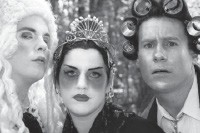With their much anticipated post-Oscar follow-up album Last 2 Walk delayed until December, Three 6 Mafia masterminds DJ Paul and Juicy J are keeping their Hypnotize Minds empire afloat with a couple of recent satellite releases: Lil Wyte’s The One and Only and Crunchy Black’s From Me to You, both produced by the Three 6 duo.
The One and Only is the third studio album from Wyte, the group’s pale-skinned, Frayser-bred protégé, and the first since 2004’s Phinally Phamous.
Wyte is actually Hypnotize Minds’ most polished MC, if not its most thoughtful lyricist. (That title would go to fellow “Bay Area” product Frayser Boy.) Lil Wyte spits with a sure, rapid flow, best heard here on “That’s What’s Up,” where he explodes at the outset: “I was born a good ole Southern boy with money up on my mind/Took a thought turned it into a rhyme/And now I do this shit all the time/Purple lean in my cup, I go with a blunt and dro up in my mouth/And I feel Pimp C. and Bun B. when say y’all need to quit hatin’ on the South.”
The regionalism on that verse locates Wyte’s anger and defiance in something specific and identifiable, but the rest of The One and Only doesn’t fare as well. It showcases an MC almost completely devoid of humor. Wyte’s celebrated patrons have been lightening up of late, but their charge seems to be overcompensating for his skin color by constantly proving how hard he is. By contrast, Houston rap honky Paul Wall gets to crack jokes, and a sense of humor was always one of Eminem’s greatest gifts.
The single “I Got Dat Candy” is a transparent attempt at piggy-backing on Wall-style auto anthems like “Drive Slow” and “Sittin’ Sideways.” Where Wall delights in his candy-coated conspicuous consumption, however, Wyte is compelled to turn even a boast about a Life Saver-colored car into a growling act of menace.
This relentless aggression wears you down when it never seems to be about anything except the artist’s (perceived) personal aggrievement. The production is solid but doesn’t exhibit the growth Three 6 has shown on their own recent releases. Paul and J are presumably saving any new “Stay Fly”s for their own forthcoming album. And though the vocal flow is more than solid, the sameness — in tone and content — gets tiresome.
If Lil Wyte is seemingly a valued member of the Hypnotize Minds camp — one whom Paul and J are grooming for a breakthrough — the same can’t be said for Crunchy Black. Long a sinister, mysterious sidekick in Three 6 proper, Crunchy Black was the first casualty of the group’s post-Oscar success, parting ways with the group due to a disagreement over finances and the direction of Crunchy’s solo career.
As such, Crunchy Black had little say over the release of From Me to You, which was apparently pulled together by Paul and J from recordings Crunchy made while still in the duo’s good graces. Crunchy’s own self-directed solo effort is expected in the coming year.
From Me to You is, like all Hypnotize Minds product, produced by Paul and J, its 11 new tracks filled out with five “screwed” remixes, which slow down tracks already on the album.
As an MC, Crunchy is either incompetent or an acquired-taste original, depending on your perspective, and I find myself coming around to the latter. Though long a Three 6 bit player, he’s responsible for the most artfully frightening moment in the Three 6 catalog with his unnervingly amoral sing-songy essay on “the money and power” to close out Project Pat’s single “Don’t Save Her.” If nothing else, Crunchy’s flow is, like Lil Wyte’s quick-lipped aggression, a worthy aural change of pace from the typical Three 6-style chanted vocals.
Unfortunately, there’s nothing on From Me to You that matches the gravity of Crunchy’s “Don’t Save Her” verse or even the colorfulness of his persona.
The opening “Do Da Crunchy Black” is, sadly, not really the gangsta-walk instructional the title suggests. I had visions of a local counterpart to “The Humpty Dance” until the song opened with a humorless call-and-response where groups of men and women hector each other. (“You can have that bitch/I don’t love that bitch,” etc. Not exactly as fun as getting busy in a Burger King bathroom.)
On the other hand, Crunchy Black does use the song as a vehicle to promise to “act a fool” on behalf of his hometown. Unfortunately, most of the city’s political class has beat him to it. Quit slipping in the game, Crunchy!
Nor is “Black on Black” the daring, envelope-pushing, critical self-examination the title suggests. It’s just a description — I think — of his ride. No candy colors for Crunchy, unless black licorice counts. At least he’s more original than Lil Wyte in this regard.
Elsewhere, From Me to You amounts to a depressingly limited vision of the boundaries of the artist’s self-described lifestyle, detailing his drug habits (“Three Different Kinds of Weed”), sexual proclivities (“Suck on the Straw”), relationships with women (“I play bitches for these riches/I’m tryin’ get whatever I can out these bitches,” from “I Play Bitches,” which seems to be a heartwarming tale of turning an abused woman into a prostitute), and other extracurricular activities (lashing out at “Snitchin’ Azz Bitches,” potentially with his “Twin 45s”).
Judging by these releases, maybe Three 6 really does need some new artists, as they themselves suggest on the “Outro” to The One and Only, or at least to hurry up with Last 2 Walk.
